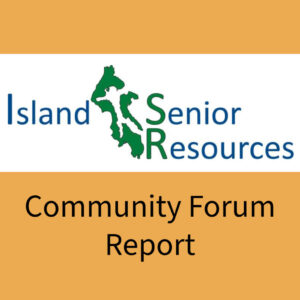Organizational Learning – Asking What Our Community Needs as it Ages
By Michele Cato, Island Senior Resources Executive Director
Island Senior Resources (ISR) strives to be a learning organization, learning from our clients, partners, affected family and friends, and programmatic lessons learned. Without active learning, we stagnate in the status quo and can miss opportunities for growth and change in ways that could better meet the needs of seniors and those who care for them.
Recently, ISR hosted three community forums on Whidbey in Langley, Coupeville, and Oak Harbor to talk with residents about what they consider to be the most important needs facing aging adults in their respective communities. Thank you to the 40+ participants who joined us in these conversations and shared their insights, experiences, and hopes to help inform our future direction and current programs. While island life means that our communities encounter many common issues, we did uncover notable distinctions from one geographic area to another.
Below is a summary of these conversations. ISR will continue to engage with the community to better understand the changing and growing needs of those we serve. ISR alone cannot meet all these needs. However, we do consider it our role to advocate on behalf of seniors with donors, partner organizations, community groups, and local governments so that collectively we can better meet the needs of Island County.
Oak Harbor’s Ranked Priority of Needs
46% Physical Environment
- affordable housing, expanded public transportation, and better internet access
19% Health Care
- more mental health services, local access to simple screening tests, not enough medical providers (especially geriatric and Medicare), more cultural interpretation
19% Economic Security
- social security doesn’t cover basic expenses, the cost of living is high, and more support for those in financial crisis
12% Community
- household chores, transportation for social activities
4% Food Security
- food costs are too high, the death of a homemaker can lead to food neglect in the surviving partner
Coupeville’s Ranked Priority of Needs
29% Physical Environment
- transportation beyond highway to remote areas, paratransit beyond bus lines, affordable housing near medical and community services, internet access for all
22% Community
- support systems to reduce isolation and alienation, neighbors need to know each other better and have access to information that could provide help to someone in need
23% Health Care
- navigating Medicare plans, transportation to medical appointments, more paratransit, more clinicians, inadequate and difficult-to-navigate insurance plans, quality of medical care, help for seniors in follow-up on care orders, cost of care
16% Food Security
- year-round access to healthy food options, lower food costs, and maintain the many resources currently in place
6% Education
- more information/education about existing services across all social agencies
South Whidbey’s Ranked Priority of Needs
20% Health Care Access
- equity investors buying up medical practices for profit, lack of access to caregivers, lack of access to mental health counseling
19% Economic Stability
- Social Security unable to cover living expenses
17% Community Connection & Social Inclusion
- caregivers need connections, lack of daycare programs for adults with disabilities
12% Humane Housing
- not enough low-income housing for seniors and for those who work low-income jobs
9% Lifelong Learning
- lifelong learning and social inclusion go together
9% Transportation
- on-demand vans to take seniors to non-medical appointments
9% Food Security
- food costs, lack of accessible food choices for diet limitations
4% Thriving Natural World
South Whidbey also discussed and ranked some potential solutions to their identified needs
31% Senior Center (traditional model, physical convening space for seniors)
- household chore support, adult daycare, art/dance/music activities; caregiver support, activities such as medical or housing consulting, exercise classes, meals, etc.
22% Caregiver Support
- caregiver respite, adult daycare, gathering place for Dementia patients; identify peer couples dealing with dementia issues in spouses, more support of 24/7 family caregivers
10% Support Groups
- visit shut-ins, list of seniors to contact for meetings
10% Information and Education
- strength class, OT, and exercise classes
10% Social Activities
- add supervised and organized social games after community lunches
5% Medical Transportation
4% Benefits Counseling
- resources beyond Medicare, add an online list of caregivers or handy people, create a list of mental health professionals who access Medicaid, Medicare, sliding scale, group therapy,
6% Other
- quality, local care space for seniors with dementia for both caregiver respite and placement, outreach to older orphans, collaboration with other organizations, senior employment opportunities

